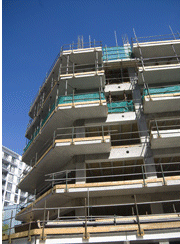Lawyer Liza Fry-Irvine told the Herald on Sunday it was one of the big downfalls of the new unit-title regime, which had been in place since 2011.
She said many would-be apartment owners were buying properties without realising their bodies corporate had opted not to maintain a fund for developments.
The pre-contract disclosure statement, given before an agreement is signed, includes information on what maintenance is planned for the next year and what money is in the body corporate accounts.
"That points towards knowing whether there is any money in the kitty, but whether purchasers understand the statement is another question," Fry-Irvine said.
It would provide no guide to planned works that were more than a year away, as large-scale renovation projects often are.
She said buyers should try to get as much detail as they could before committing to anything. "People just aren't aware. The way the disclosure regime is drafted, it's missing some of the essential information and that will be catching people out."
An average Auckland apartment body corporate annual fee is $5,000 a unit, but the amount is set at each annual general meeting and can increase quickly. Metropolis residents are paying on average $7,800 a year in body corporate levies, and face a $4 million bill to cover extra repairs.
Fry-Irvine was not aware of any buyers taking bodies corporate to court over the issue, but maintenance plans have been a legal requirement only since October 1.
John Gray, of home-owner advocate group Hobanz, said terraced houses and apartments often worked out to be dearer than they first seemed. "Terraced houses and apartments are seen as the new entry point because they are seen to be affordable but it is a fallacy," he said.
"In many cases the full costs for ongoing maintenance are not made clear, or levies are kept low to make properties look more affordable."
Gray knew of a North Shore complex that had a $2.8 million shortfall in its maintenance budget.
"It is a growing problem for sure, and it is something people need to be made aware of. There is a huge shadow of debt building over a lot of properties and there will be huge levies in the future."
Real Estate Institute chief executive Helen O'Sullivan said before purchasing anything, people should work out how the body corporate was run, how much money it had, who was running it and what a typical meeting was like. "You need to do due diligence on the body corporate to the same or even a greater extent than you do on the property itself."

![[TMM Podcast] Yelsa serves up “marine reserve” of property buyers](https://www.goodreturns.co.nz/pics/mike%20harvey.jpg)



 Search
Search
